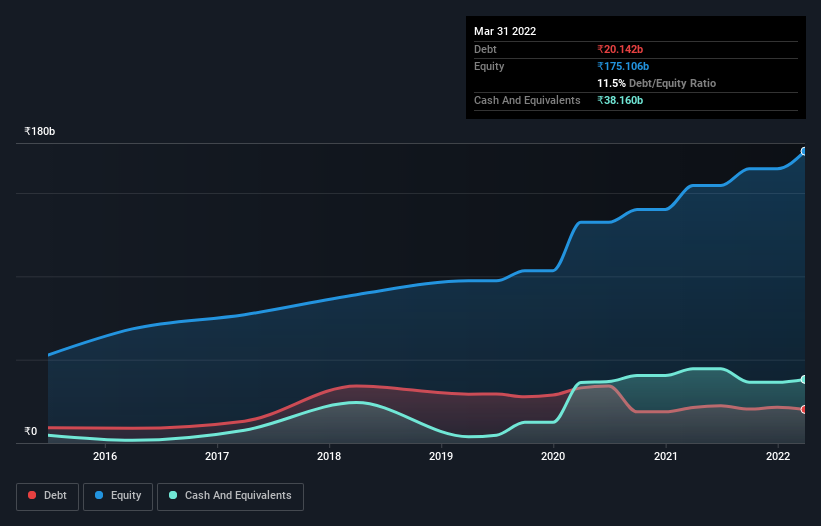- India
- /
- Basic Materials
- /
- NSEI:SHREECEM
These 4 Measures Indicate That Shree Cement (NSE:SHREECEM) Is Using Debt Reasonably Well

The external fund manager backed by Berkshire Hathaway's Charlie Munger, Li Lu, makes no bones about it when he says 'The biggest investment risk is not the volatility of prices, but whether you will suffer a permanent loss of capital.' When we think about how risky a company is, we always like to look at its use of debt, since debt overload can lead to ruin. We can see that Shree Cement Limited (NSE:SHREECEM) does use debt in its business. But is this debt a concern to shareholders?
When Is Debt A Problem?
Debt and other liabilities become risky for a business when it cannot easily fulfill those obligations, either with free cash flow or by raising capital at an attractive price. In the worst case scenario, a company can go bankrupt if it cannot pay its creditors. However, a more frequent (but still costly) occurrence is where a company must issue shares at bargain-basement prices, permanently diluting shareholders, just to shore up its balance sheet. Of course, plenty of companies use debt to fund growth, without any negative consequences. The first step when considering a company's debt levels is to consider its cash and debt together.
Check out our latest analysis for Shree Cement
What Is Shree Cement's Net Debt?
As you can see below, Shree Cement had ₹20.1b of debt at March 2022, down from ₹21.3b a year prior. However, it does have ₹38.2b in cash offsetting this, leading to net cash of ₹18.0b.

How Strong Is Shree Cement's Balance Sheet?
The latest balance sheet data shows that Shree Cement had liabilities of ₹46.9b due within a year, and liabilities of ₹15.5b falling due after that. Offsetting these obligations, it had cash of ₹38.2b as well as receivables valued at ₹8.14b due within 12 months. So it has liabilities totalling ₹16.1b more than its cash and near-term receivables, combined.
Since publicly traded Shree Cement shares are worth a total of ₹692.7b, it seems unlikely that this level of liabilities would be a major threat. Having said that, it's clear that we should continue to monitor its balance sheet, lest it change for the worse. While it does have liabilities worth noting, Shree Cement also has more cash than debt, so we're pretty confident it can manage its debt safely.
But the other side of the story is that Shree Cement saw its EBIT decline by 8.2% over the last year. That sort of decline, if sustained, will obviously make debt harder to handle. There's no doubt that we learn most about debt from the balance sheet. But ultimately the future profitability of the business will decide if Shree Cement can strengthen its balance sheet over time. So if you're focused on the future you can check out this free report showing analyst profit forecasts.
But our final consideration is also important, because a company cannot pay debt with paper profits; it needs cold hard cash. While Shree Cement has net cash on its balance sheet, it's still worth taking a look at its ability to convert earnings before interest and tax (EBIT) to free cash flow, to help us understand how quickly it is building (or eroding) that cash balance. Over the last three years, Shree Cement recorded free cash flow worth a fulsome 82% of its EBIT, which is stronger than we'd usually expect. That positions it well to pay down debt if desirable to do so.
Summing up
We could understand if investors are concerned about Shree Cement's liabilities, but we can be reassured by the fact it has has net cash of ₹18.0b. And it impressed us with free cash flow of ₹4.5b, being 82% of its EBIT. So we don't think Shree Cement's use of debt is risky. There's no doubt that we learn most about debt from the balance sheet. But ultimately, every company can contain risks that exist outside of the balance sheet. We've identified 2 warning signs with Shree Cement , and understanding them should be part of your investment process.
If you're interested in investing in businesses that can grow profits without the burden of debt, then check out this free list of growing businesses that have net cash on the balance sheet.
New: Manage All Your Stock Portfolios in One Place
We've created the ultimate portfolio companion for stock investors, and it's free.
• Connect an unlimited number of Portfolios and see your total in one currency
• Be alerted to new Warning Signs or Risks via email or mobile
• Track the Fair Value of your stocks
Have feedback on this article? Concerned about the content? Get in touch with us directly. Alternatively, email editorial-team (at) simplywallst.com.
This article by Simply Wall St is general in nature. We provide commentary based on historical data and analyst forecasts only using an unbiased methodology and our articles are not intended to be financial advice. It does not constitute a recommendation to buy or sell any stock, and does not take account of your objectives, or your financial situation. We aim to bring you long-term focused analysis driven by fundamental data. Note that our analysis may not factor in the latest price-sensitive company announcements or qualitative material. Simply Wall St has no position in any stocks mentioned.
About NSEI:SHREECEM
Shree Cement
Engages in the manufacture and sale of cement and clinker in India and internationally.
Flawless balance sheet average dividend payer.


